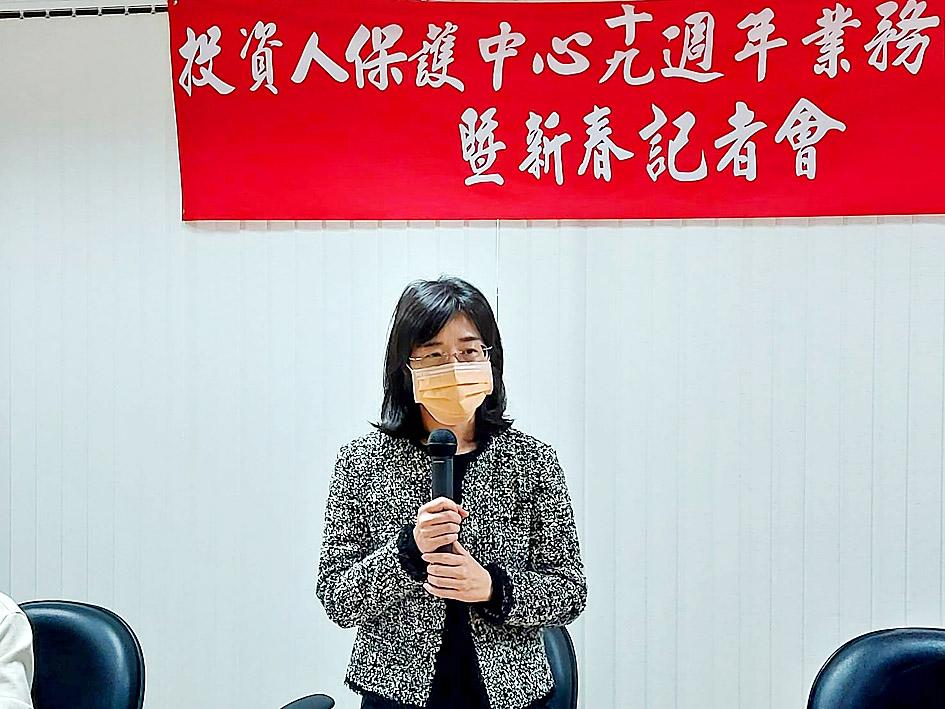The Securities and Futures Investors Protection Center last year filed 11 class-action lawsuits on behalf of 7,982 investors, with the largest against Pharmally International Holding Co (康友製藥) involving 4,700 complainants, the center said yesterday.
The biotechnology company allegedly forged financial statements and had been unable to submit audited reports since the first quarter of 2020 before it was delisted in April last year, leaving thousands of shareholders out of pocket.
The center filed a lawsuit against Pharmally International at the Taipei District Court on behalf of 4,700 investors, seeking total compensation of NT$5.4 billion (US$195.17 million), center chairwoman Chang Hsin-ti (張心悌) told a news conference in Taipei.

Photo: Chen Yung-chi, Taipei Times
It was the largest case the center has dealt with since it filed suits against Pacific Electric Wire and Cable Co (太平洋電線電纜) on behalf of 24,772 investors in 2011 and XPEC Entertainment Inc (樂陞科技) on behalf of 19,620 investors in 2016, its data showed.
The judicial process should be smooth in Taiwan, but even if Pharmally International loses the case, there would be some challenges regarding how to execute orders by domestic courts abroad, as the firm has assets in China and Southeast Asia, Chang said.
After the Commercial Case Adjudication Act (商業事件審理法) took effect in July last year, the center has filed five lawsuits at commercial courts, with investors demanding more than NT$100 million in total compensation, she said.
The five lawsuits are against Dukang Distillers Holdings Ltd (杜康控股), ASE Technology Holding Co (日月光投控), Roo Hsing Co (如興股份), Chernan Metal Industrial Corp (晟楠科技) and Topower Co (至寶光電), Chang said.
The center sued Roo Hsing, one of the world’s largest manufacturers of denim jeans, as its prospectus was allegedly false, and brought ASE to the court as investors encountered losses due to insider trading, it said.
Those cases would be reviewed at a faster pace at commercial courts, the center said.
The center won 10 cases with combined compensation of about NT$2.7 billion last year, it said.
The center, which has 12 lawyers and 30 employees, plans to recruit two or three additional lawyers to enhance its capabilities, Chang said.

Taiwan Semiconductor Manufacturing Co (TSMC, 台積電) secured a record 70.2 percent share of the global foundry business in the second quarter, up from 67.6 percent the previous quarter, and continued widening its lead over second-placed Samsung Electronics Co, TrendForce Corp (集邦科技) said on Monday. TSMC posted US$30.24 billion in sales in the April-to-June period, up 18.5 percent from the previous quarter, driven by major smartphone customers entering their ramp-up cycle and robust demand for artificial intelligence chips, laptops and PCs, which boosted wafer shipments and average selling prices, TrendForce said in a report. Samsung’s sales also grew in the second quarter, up

On Tuesday, US President Donald Trump weighed in on a pressing national issue: The rebranding of a restaurant chain. Last week, Cracker Barrel, a Tennessee company whose nationwide locations lean heavily on a cozy, old-timey aesthetic — “rocking chairs on the porch, a warm fire in the hearth, peg games on the table” — announced it was updating its logo. Uncle Herschel, the man who once appeared next to the letters with a barrel, was gone. It sparked ire on the right, with Donald Trump Jr leading a charge against the rebranding: “WTF is wrong with Cracker Barrel?!” Later, Trump Sr weighed

HEADWINDS: Upfront investment is unavoidable in the merger, but cost savings would materialize over time, TS Financial Holding Co president Welch Lin said TS Financial Holding Co (台新新光金控) said it would take about two years before the benefits of its merger with Shin Kong Financial Holding Co (新光金控) become evident, as the group prioritizes the consolidation of its major subsidiaries. “The group’s priority is to complete the consolidation of different subsidiaries,” Welch Lin (林維俊), president of the nation’s fourth-largest financial conglomerate by assets, told reporters during its first earnings briefing since the merger took effect on July 24. The asset management units are scheduled to merge in November, followed by life insurance in January next year and securities operations in April, Lin said. Banking integration,

LOOPHOLES: The move is to end a break that was aiding foreign producers without any similar benefit for US manufacturers, the US Department of Commerce said US President Donald Trump’s administration would make it harder for Samsung Electronics Co and SK Hynix Inc to ship critical equipment to their chipmaking operations in China, dealing a potential blow to the companies’ production in the world’s largest semiconductor market. The US Department of Commerce in a notice published on Friday said that it was revoking waivers for Samsung and SK Hynix to use US technologies in their Chinese operations. The companies had been operating in China under regulations that allow them to import chipmaking equipment without applying for a new license each time. The move would revise what is known